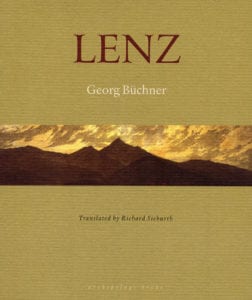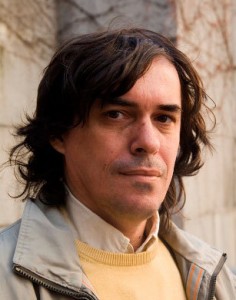
GUEST POST: In honor of German author Georg Büchner’s 200th birthday, Lenz translator Richard Sieburth celebrates this historic day:
Oct. 17 is the bicentenary of Georg Büchner‘s birth–a date he shares with his distant American doppelgänger, Nathaniel West.
According to Paul Celan (in The Meridian, his 1960 acceptance speech for the Georg Büchner Prize), dates matter.
In the edition of Büchner’s Lenz that Celan had on hand (as emended by an early twentieth-century editor), the first sentence read: “The 20th of January, Lenz walked through the mountains.” Associating this date with January 20, 1942, the day on which the implementation of the Final Solution was discussed at the Wannsee Conference in Berlin, Celan comments (in Pierre Joris’s translation):
Perhaps one can say that each poem has its “20th of January” inscribed within it? Perhaps what’s new in the poems written today is exactly this: theirs is the clearest attempt to remain mindful of such dates? But don’t we all write ourselves from such dates? And toward what dates do we write ourselves?
Here are the opening lines of Lenz (which I based on the most recent German edition, which drops the spurious “January,” lacking in Büchner’s original manuscript version):
The 20th, Lenz walked through the mountains. Snow on the peaks and upper slopes, gray rock down into the valleys, swatches of green, boulders, and firs. It was sopping cold, the water trickled down the rocks and leapt across the path. The fir boughs sagged in the damp air. Gray clouds drifted across the sky, but everything so stifling, and then the fog floated up and crept heavy and damp through the bushes, so sluggish, so clumsy. He walked onward, caring little one way or another, to him the path mattered not, now up, now down. He felt no fatigue, except sometimes it annoyed him that he could not walk on his head.
Of this last sentence Celan observes: “He who walks on his head . . . has the sky beneath himself as an abyss.” In a 1925 essay on Büchner, German critic Arnold Zweig had already claimed: “this sentence marks the beginning of modern European prose.” For Deleuze and Guattari, the “promenade schizophrénique”of this first paragraph of Lenz in turn enacts a kind of rhizomic “thrust” or “traversal” with which we are, to this day, still catching up.
Dates still matter: On Oct 17, 1961, over 200 pro-FLN Algerian sympathizers were killed by French police thugs (on the orders of ex-collabo Maurice Papon) in the so-called Paris Massacre. Georg Büchner, author of an incendiary 1834 pamphlet encouraging the peasants of Hessia to rise up in armed revolt against their feudal overlords, would have appreciated this date.
In honor of Georg Büchner’s 200th birthday, we’re offering Lenz for only $10.00 on our website from now until October 17th only! Just type the Coupon Code 200lenz at checkout.
Richard Sieburth is the translator of LENZ, as well as The Salt Smugglers, Emblems of Desire, and Stroke by Stroke, among others. His English edition of the Nerval’s Selected Writings won the 2000 PEN/ Book-of-the-Month-Club Translation Prize. His recent translation of Maurice Sceve’s Délie was a finalist for the PEN Translation Prize and the Weidenfeld Prize.





 Jan Decleir is a prolific Belgian film and stage actor born in Niel, Antwerp. He has started in Academy Award winning movies as Karakter and Antonia. For his role in The Barons, he received the Margritte Award for Best Supporting Actor.
Jan Decleir is a prolific Belgian film and stage actor born in Niel, Antwerp. He has started in Academy Award winning movies as Karakter and Antonia. For his role in The Barons, he received the Margritte Award for Best Supporting Actor.
